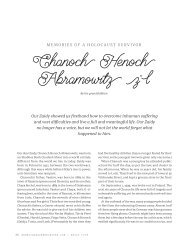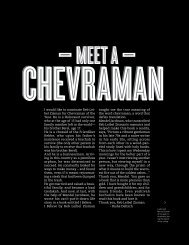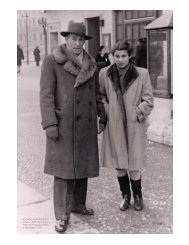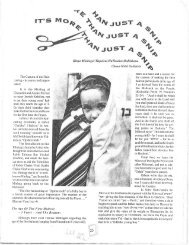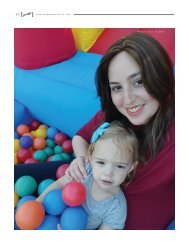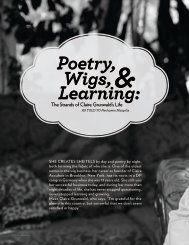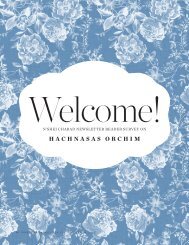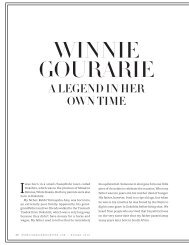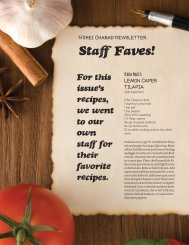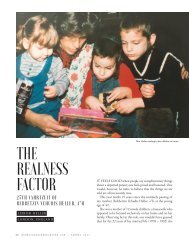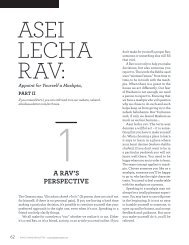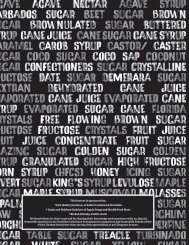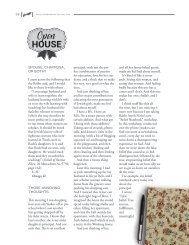Create successful ePaper yourself
Turn your PDF publications into a flip-book with our unique Google optimized e-Paper software.
to clean every crevice of the refrigerator,<br />
people cover it to be safe.<br />
In days of old, when they stored<br />
food in wooden closets, the Maharil<br />
cautioned to cover those closets<br />
used during the year for chometz,<br />
even though they were cleaned for<br />
Pesach. Covering with foil may lead<br />
to transgressing the important halachic<br />
prohibition of bal tashchis<br />
since foil is known to cause refrigerators<br />
to break. If a refrigerator<br />
breaks down during Yom Tov and<br />
all the food spoils, this greatly compounds<br />
the issue. Therefore, plastic<br />
refrigerator lining is a good choice<br />
for covering.<br />
IF CLOTHING HAS BEEN WASHED<br />
IN DETERGENT OR DRY CLEANED,<br />
DO POCKETS NEED TO BE CHECKED<br />
BEFORE <strong>PESACH</strong>?<br />
There is no need to check the pockets<br />
of clothing which has been<br />
washed in soap or dry cleaned<br />
before Pesach (rendering all possible<br />
chometz inedible). This only<br />
applies to clothing which was not<br />
worn afterwards, so that there wasn’t<br />
a chance to put fresh chometz into<br />
the pockets after cleaning.<br />
IN WHAT CASES MAY I DO LAUN-<br />
DRY DURING CHOL HAMOED?<br />
SOME DON’T AT ALL, BUT I CAN’T<br />
AFFORD TO BUY 8-9 YOM TOV<br />
OUTFITS FOR MY CHILDREN. THE<br />
CLOTHING THEY WEAR TO THE<br />
SEDORIM, AND ON CHOL HAM-<br />
OED, GETS DIRTY?<br />
The Torah mandates that we wash<br />
ourselves and our clothing before<br />
Yom Tov so that we should be clean<br />
and fresh for the holiday, and not in<br />
a state of “menuval,” i.e. filthy and<br />
contemptible. Shulchan Aruch forbids<br />
doing laundry on Chol Hamoed,<br />
even if done by a non-Jew, in order<br />
that we should be extra particular<br />
to enter Yom Tov with fresh, clean<br />
clothing. The exceptions include<br />
clothing for small children who<br />
soil themselves very often: one<br />
may do any amount of laundry for<br />
them, as there is no limit to how<br />
many changes of clothing they<br />
will need in a day. For older children<br />
who soil themselves but not<br />
as frequently, one may only wash<br />
what they need to wear right now,<br />
not what might be needed in a few<br />
days. One must wash only what is<br />
immediately needed at the time it<br />
is needed. There is no reason to buy<br />
8-9 outfits for each child in order<br />
to avoid doing laundry for them.<br />
For an adult, however, it is preferable<br />
to buy new clothing on Chol<br />
Hamoed rather than to resort to<br />
washing dirty clothing.<br />
IS IT IMPORTANT FOR GIRLS<br />
AND WOMEN TO WEAR YOM<br />
TOV CLOTHING, RATHER THAN<br />
ROBES, AT THE SEDORIM? DUR-<br />
ING THE WEEK I ALWAYS WEAR<br />
AN APRON, AND ON SHABBOS<br />
A DARK ROBE, BECAUSE EVERY<br />
TIME I AM AROUND FOOD, MY<br />
CLOTHES GET DIRTY. AM I GIVING<br />
SUFFICIENT KAVOD TO YOM TOV?<br />
As long as the robes are appropriate<br />
for Yom Tov and are totally<br />
tzniusdik, there is no problem for<br />
women and girls to wear robes to<br />
the sedarim and in the house. Tznius<br />
and Yom Tov suitability are high<br />
priorities for women’s clothing at<br />
home. There is no halachah that<br />
one must wear outdoor clothing in<br />
the house on Shabbos and Yom Tov.<br />
SHAMPOOS, MAKEUP, VITAMINS:<br />
IS IT REALLY PERMISSIBLE TO USE<br />
ONLY THOSE IN THE “LIST”? WHY<br />
WOULD THEY BE CHOMETZDIK,<br />
SINCE THEY’RE NOT EDIBLE AT<br />
ALL?<br />
According to halachah, if chometz<br />
is nifsal mei’achilas kelev (unfit for<br />
canine consumption) it is not considered<br />
chometz. Such chometz<br />
is considered, in the words of the<br />
Gemara, “mere dust.” If it is fit for<br />
canine consumption, even though<br />
it is inedible for a human, it is no<br />
different than yeast which is specifically<br />
forbidden by the Torah on<br />
Pesach, since it has the ability to<br />
ferment bread.<br />
The definition, however, of nifsal<br />
is not that straightforward. The<br />
fact that contemporary norms render<br />
something inedible doesn’t<br />
mean that halachah would treat<br />
it the same. Some things are considered<br />
in halachah fit for human<br />
consumption, though nowadays<br />
people would be repulsed by the<br />
thought of eating them.<br />
Many products, such as perfume,<br />
contain pure denatured alcohol.<br />
Some opinions consider denatured<br />
alcohol suitable for consumption,<br />
since some alcoholics would drink<br />
this with slight additions. Poskim<br />
also address the fact that in today’s<br />
day and age it can be restored to regular<br />
drinkable alcohol through the<br />
addition of certain chemicals. However,<br />
it should be noted that some<br />
products cannot be reconstituted as<br />
drinkable alcohol, especially products<br />
using completely denatured<br />
alcohol (CDA). Examples include<br />
nail polish, hand lotion, shoe polish<br />
and paint.<br />
Another consideration is the<br />
minority view that the exemption<br />
of nifsal applies only to items that<br />
are normally consumed, not an item<br />
that has initially been produced<br />
APRIL 2014<br />
87




